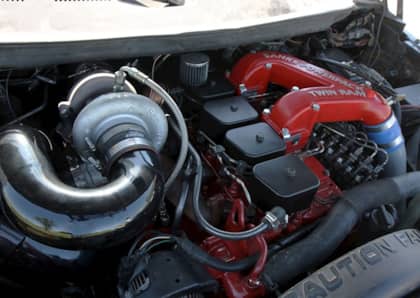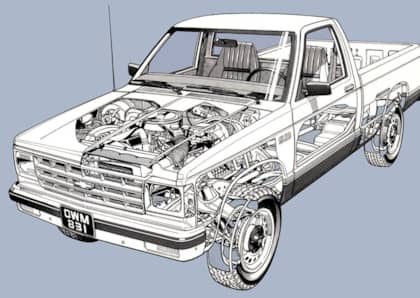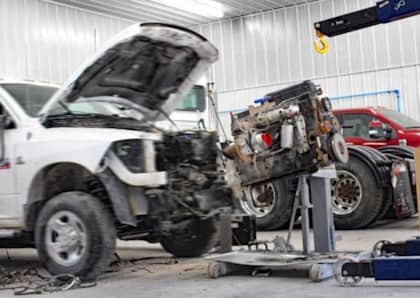Forward Progress: How to Get All Your Diesel’s Power to the Ground
Doubling and even tripling the power of a modern diesel pickup is nothing new. With stout bottom ends, high-pressure fuel injection systems and turbochargers filling their lungs, diesel engines can effectively transform the trucks they motivate into 8,000-pound hot rods. The challenge is making sure your suspension and driveline are ready for the added oomph. Your truck’s rear suspension didn’t leave the factory with the ability to cope with 1,000 lb-ft or more of torque, and it doesn’t take long for the phenomenon known as “axlewrap” to surface.

What Is Axlewrap?
When the added torque from the engine hinders the rear suspension’s ability to keep the axle stationary, axlewrap is at work. Under load, the leaf springs will deform (attempting to twist into an S shape), and the axlehousing will try to rotate, pushing the pinion gear upwards.
Some noticeable signs of axlewrap are:
Wheel hop, which is a skipping feeling from the rear of the truck, and bouncing during transmission upshifts (in trucks with automatic transmissions). Driveshaft plunge, driveline shake, differential twist and takeoff shudder can all be a part of the axlewrap experience, too, which over time can result in premature U-joint failure, slip-spline wear on the driveshaft and pinion gear and/or yoke failure.
The Solution to Axlewrap
To remedy inevitable axlewrap scenarios, traction bars are employed. Traction bars effectively link the rear axle to the frame, keeping the rear leaf springs from twisting, the axle from rotating and the wheels from digging. If you’re thinking about pumping up the power of your diesel (and even if you’re only adding a programmer), we advise you to seriously consider working a set of quality traction bars into your budget. After all, all the added horsepower and torque in the world is useless if it can’t be used to make forward progress.
Read on for a closer look at some of the best traction bar setups we’ve encountered.
The Best Traction Bar Setups
As one of the most common problem-solver parts in the diesel industry, traction bars come in all shapes and sizes. However, they all aim to serve the same purpose: keep the rear suspension geometry in its optimum position and the axle stationary under acceleration. A lot of setups are homebuilt, some are pieced together using components sourced from suspension specialists like Ballistic Fabrication; complete bolt-on or weld-on systems can be had from dozens of companies, including One Up Offroad, Flight Fabrications, Big Chevy Hitch and Calvert Racing, to name a few.

Some of the most sought after traction bars in the diesel industry come from One Up Offroad. Offering both bolt-on and weld-on type bars, One Up Offroad products are known for their performance, durability and quietness. We’ve run a set of the company’s short-gusset, universal bars on our own F-350 for nearly six years now, and the bushings still look new. No corrosion has started (picture cold, salty Midwest winters and constant exposure to humidity), and we can cut 1.7-second 60-foot times at the dragstrip thanks to their presence.

One Up Offroad offers meaty, ¼-inch thick frame mounts that incorporate large, 7/8-inch traction bar bolts with polyurethane bushings. The bars themselves measure 1.75-inches (od). A set of One Up’s long-gusset universal traction bars is shown below.

In the photo below you can see that four 3/8-inch mounting bolts exist in the bottom side of One Up Offroad’s traction bar frame mounts. What you can’t see are the other four bolts securing this bracket to the side of the frame rail. That’s right – eight Grade 8 fasteners are used to clamp these bad boys in place. Without a doubt, the most labor intensive part of installing One Up’s industry-leading bars is drilling the 16 required mounting holes in the frame.

The bolt-on, One Up Offroad axle mount shown here employs a burly, ¾-inch center gusset. Also notice that ¾-inch outer diameter, inverted-style (’11-present Super Duty) U-bolts are being used, which are said to provide an additional 2,000 pounds’ worth of clamping force.

Well-known for allowing leaf sprung cars to compete with vehicles sporting 3-and-4-link rear suspension systems, Calvert Racing’s CalTracs have also found a home in many diesel truck applications. When you couple their pre-load adjustability with a properly spec’d (or adjusted) set of shocks, CalTracs perform just as well (if not better) than the top-shelf traction bar options currently on the market. The set that resides under Matt Misner’s 9-second, triple-turbo, Duramax-powered ¾-ton Chevy Silverado is shown below.

When it comes to building your own set of traction bars, the options are endless. You can opt for high-quality, serviceable bushings, chromoly tubing and Grade 8 hardware, or you can piece together a low-budget set of bars like a lot of truck pullers do (just remember, you get what you pay for). You can also fabricate your own axle and frame mounts or outsource them, and you can opt to either bolt them on or weld them in place. By and large, 2-inch outer diameter, ¼-inch wall DOM tubing is most popular, as well as bolt-on brackets over weld-on units.

In sled pulling applications, some truck owners get pretty creative. Take Heather Clarke’s ’02 Chevy Silverado 2500 HD for example, where a four-link style ladder bar setup is utilized. The system features a bar mounted both above and below the rear axle tube, which not only keeps the axle from rotating (what all traction bars do) but also rules out any upward or downward movement. This is extremely helpful for a truck subjected to the rigorous abuse experienced during the course of a pull.
We’ll note that this configuration is for sled pulling use only. In a street driven application, you never want to limit the ability of the rear axle to move up and down (only its ability to rotate).

Believe it or not, traction bars can actually improve the braking ability of a truck. While acceleration without traction bars forces the pinion angle upward, heavy braking causes the opposite to occur (the pinion angle is forced downward). Traction bars keep the pinion angle the same no matter the circumstance.

One easy way to tell if a truck needs traction bars is how the rear axle and suspension behaves while on a chassis dyno (or, as many have done, throw the GoPro under the truck and take a test drive). During a dyno pull, where maximum horsepower and torque is being sent to the rollers, axle wrap will be in its most prevalent state if it exists at all. Driveshaft plunge and an upward-pointing pinion angle are key items to look for.

An up and coming player in the traction bar market is Flight Fabrications. The company builds ladder bar-style traction bars using 1.75-inch and 1-inch 1026 DOM tubing, makes use of ¼-inch thick, bolt-on mounting brackets, and employs grease-able Johnny Joints from Currie Enterprises. Last but not least, Flight’s bars can be had with an optional feature where LEDs illuminate the company nameplate for a one-of-a-kind look.

You won’t find any truck hooking to the sled without a set of traction bars. Arguably no other sport wreaks as much havoc on a driveline than sled pulling (axleshafts, differentials, driveshafts, U-joints, pinion yokes, etc.).

But make no mistake, traction bars aren’t just reserved for all-out, competition-only vehicles. As a general rule of thumb, they are needed as soon as 100 extra horsepower has been added to the mix.







